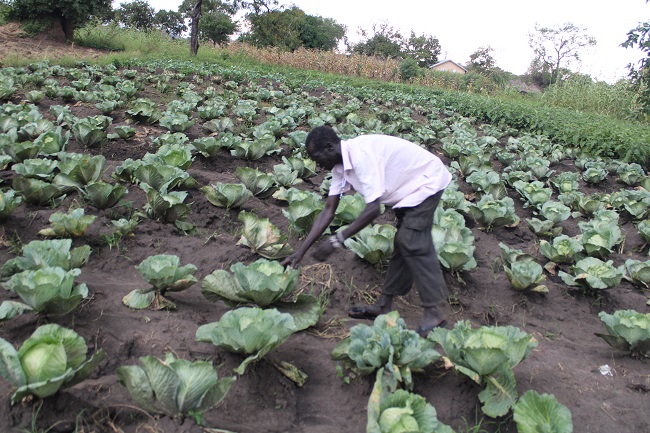
ADJUMANI, November 21, 2023 – A number of development partners are supporting refugees in Uganda to adapt to the impacts of climate change to fight food insecurity and malnutrition.
One of the refugees who has benefited from the hand of development partners is Simon Shoro, a refugee from South Sudan who has been living in Maaji II Refugee Settlement in Adjumani district for more than six years now. Shoro plants fast-maturing crops as he mulches the small gardens using grass.
He says he has been renting small gardens from the members of the host community at the cost of Shs 100,000 per planting season, to grow vegetables, which he sells to earn an income for his family.
He says: “I have been planting cabbages, tomatoes, eggplants, and onions. I practice mulching. During the dry season, I irrigate my vegetables and during the rainy season, I ensure the gardens have drainage channels to allow water to flow out.”
He says growing his own food supplements that that he receives as a refugee, adding that he uses the money from the vegetables sold to pay school fees for his children.
Marcelina Ojjaba, a refugee at Pagirinya Refugee Settlement, Block C, Custer 15 in the east of Adjumani district, says she has been growing her own food since the World Food Programme [WFP] reduced the food rations for the refugees. “I now supplement my food by digging in my small plot of 30 by 30 where I plant okra, cabbage, eggplants, cowpeas among others,” Ojjaba says.
She lauds Action Against Hunger Uganda, a non-governmental organisation, for supporting the refugees by helping them to acquire land for agriculture and also providing them with seeds to plant.
The Agricultural Officer Dzaipi Sub-country in Adjumani Vuciri James Logwenya says that the refugees need to be sensitised so that they move away from waiting for relief food, and grow their own food using land provided by the host communities.
Logwenya says the level of food production in the district is low due to climate change, which has resulted into food insecurity among both the host communities and the refugees.
‘’We need to engage them [refugees] to embrace climate smart agriculture where production continues throughout the year,” Logwenya says.
He added that they encouraging refugees to grow green vegetables to fight malnutrition among the communities in the district.
Titus Jogo, the Refugee Desk Officer in Adjumani commends the host communities for accepting to share land with the refugees. “My only appeal is for the refugees to take advantage of the land offered by the nationals, if they are to end hunger,” Jogo says.
Against Against Hunger Uganda is implementing a five years project called the Right to Grow a Consortium Project funded by the Dutch Government to reduce undernutrition in Uganda, especially child stunting.
According to Mariam Akiror, Advocacy and Strategic Partnership Coordinator for Action Against Hunger Uganda , the Right to Grow Project has since 2022 been implementing an advocacy campaign on communal production, consumption and marketing of nutritious food crops for Improved health, nutrition, livelihoods, self-reliance in Adjumani and Yumbe districts.
“This campaign is also facilitating access to additional land for agricultural production for refugees and host communities as well as promoting cohesion between Refugees and Host Communities, we are also promoting climate change adaption,” she says.
Under the Right to Grow Project, landlords from the two sub counties of Dzaipi and Ukusijoni have donated more than 2,000 acres of land to both the refugees and host communities.
Additional reporting by Babra Anyait.
Buy your copy of thecooperator magazine from one of our country-wide vending points or an e-copy on emag.thecooperator.news